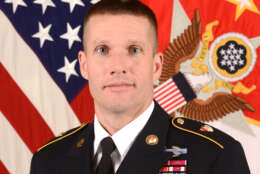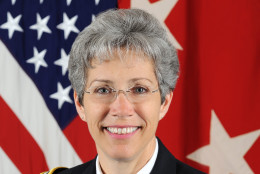Army
-
Sergeant Major of the Army Daniel Dailey hopes improved recruitment and retention practices as well as a new evaluation system for non-commissioned officers will strengthen the ranks in the face of budget cuts.
September 09, 2015 -
The Army is instituting a new evaluation system for determining who gets promoted. It will start to use its new non-commmissioned officer evaluation report in 2016. The Army is fine-tuning the NCOER and training personnel on how to use it. Sgt. Maj. of the Army Dan Dailey joined In Depth with Francis Rose on Pentagon Solutions today. He explains why the Army decided the new evaluation system was necessary and why the new one will bring the Army better leadership.
September 09, 2015 -
The primary debate about the future of the Army right is how large or small it should be. But that's precisely the wrong debate given the wars in Iraq and Afghanistan are still going. Retired Army Lt. Gen. James Dubik is former commander of the Multi-National Security Transition Command in Iraq, and is now senior fellow at the Institute of Land Warfare at the Association of the Army. He tells In Depth with Francis Rose that there are seven factors to consider before the war ends.
August 28, 2015 -
The Army awarded the Joint Light Tactical Vehicle to Oshkosh. The contract could be worth as much as 30 billion dollars. The award is a blow to Lockheed Martin and AM General, the other bidders on the contract. James Tinsley is managing director at Avascent. He's been following the JLTV competition since the beginning and he tells In Depth with Francis Rose that the award to Oshkosh isn't a huge surprise.
August 26, 2015 -
Defense Department Comptroller Michael McCord sent a reprogramming request to Congress in July asking to move money around to help pay for identity protection and data breach services as well as higher costs for security clearance background investigations.
August 25, 2015 -
A new analysis from the federally-funded RAND Corporation shows “significant shortcomings” in the forces planned to meet three major defense missions under the military's plan to reduce the active duty Army to 450,000 soldiers.
August 24, 2015 -
As the Army prepares to graduate the first two female Rangers in its history in a ceremony tomorrow, officials are insisting they did not alter their training standards to accommodate the Army’s first round of female students. But it’s still unclear whether those two new Rangers will ever be allowed to serve in direct ground combat. More from Federal News Radio DoD Reporter Jared Serbu.
August 20, 2015 -
The Army plans on requesting proposals for the third iterations of its ITES and ADMC contracts by next January. New proposals will likely tackle target areas such as mobility, cloud integration and cybersecurity, but CHESS wants to make sure small businesses are in the running for contracts.
August 20, 2015 -
The Army is reviewing information it got from industry after its industry days for its new Information Technology Enterprise Solutions 3 Services and Army Desktop and Mobile Computing 3 Contracts. Tom Neff is project director for Computer Hardware and Enterprise Software Solutions at PEO Enterprise Information Systems. He tells In Depth with Francis Rose about the new contracts, what Army users will buy from them, what industry should do to get on them and what the Army hopes the contract will achieve.
August 19, 2015 -
For people in, or going into the military, the benefits programs — while excellent in some cases — are a mystery. Many people don't realize that members of the uniformed military services are eligible for the government's long term care insurance program.
August 19, 2015 -
Two women will graduate from the Army's Ranger School Friday. They are the first females to pass the grueling combat training program. But they're not guaranteed assignments with the Ranger regiment. New Army Chief of Staff Mark Milley will likely recommend which jobs should be open to women. Steve Bucci is a senior fellow for homeland security and defense issues at the Heritage Foundation and former assistant deputy secretary of defense and retired Army Special Forces officer. He tells In Depth with Francis Rose, what's next for the Ranger graduates.
August 18, 2015 -
If progress stalls against the Islamic State terrorist group, the U.S. military should start embedding troops with forces battling the Islamic State militants in Iraq. That's according to Army Chief of Staff Gen. Ray Odierno, who's retiring this month after a 39-year Army career. But what's the feasibility of Odierno's recommendation, and would it even work? Retired Lt. Gen. Dave Barno is a former senior American commander of U.S. and coalition forces in Afghanistan and now a distinguished practitioner-in-residence at American University. He joined Tom Temin on the Federal Drive to analyze the plan.
August 17, 2015 -
The Defense Department’s program to let employees use smartphones on the secret network is becoming more popular than ever imagined.
August 17, 2015 -
The Defense Department has a new agency. It's the Joint Improvised-Threat Defeat Agency , or JIDA. The new combat support agency is built from what had been the Joint Improvised Explosive Device Defeat Organization. Army Maj. Gen. Julie Benz is the Acting Director of JIDA. She joined Tom Temin on the Federal Drive with more on the agency and its refreshed mission.
August 14, 2015 -
Gen. Ray Odierno, the departing Army chief, said he’s worried about the service because most U.S. forces are underprepared for some of the circumstances they might face, such as “hybrid” warfare against Russian proxies.
August 13, 2015












